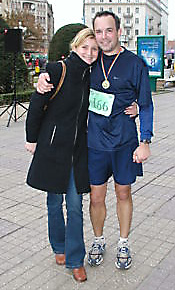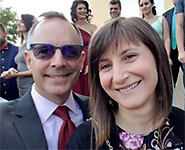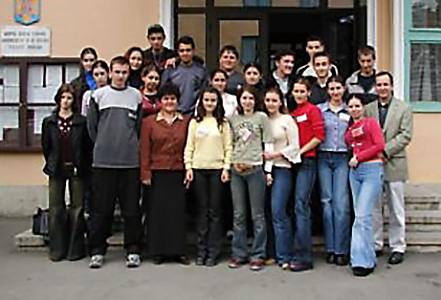“Back at Site” by Andy Trincia (Romania)
Back at Site
by Andy Trincia (Romania 2002-2004)
In Peace Corps vernacular, it’s called “site.” That’s where you live, your base. It could be a remote village, a crossroads town, even a big city. During two years of service, Peace Corps Volunteers utter that word countless times. “Heading back to site,” we’d say. For some, site was a blip on life’s radar. For me, it became a pivotal place – and a home.
Now, 15 years later, I’m once again living in Timișoara, Romania. Back at site.
Some cities are great to visit while others just give you a certain feel, a sense of comfort, a vibe that you could live there. That’s how Timișoara (pronounced Tim-ee-shwoara) was for me. I remember the first time I saw Victory Square (Piaţa Victoriei) in the city’s core. Hopping off a train at the drab railway station and walking a mile down a noisy boulevard lined with gray communistic buildings, I started to wonder. Then I rounded a corner and there was this magnificent public space, a rectangle the length of four football fields, lined with majestic architecture and sidewalk cafes, bookended neatly by the Opera House and the Orthodox Cathedral. It made a lasting impression and the city, Romania’s 3rd largest, continued to grow on me.
I arrived in 2002 in the middle of my 30s and my career. Like most Peace Corps Volunteers, I was full of idealism and trying to “make a difference” and do some good for the world while taking a hiatus from corporate life. I suppose that I succeeded in small ways, as a business consultant and teacher, but I could not have dreamed what would happen along the way.

Oana and Andy in Victory Square, Timișoara after he ran a half-marathon, 2003.
That Opera House? I met my future wife, Oana, inside there just a few months into my Peace Corps service. And Victory Square? My first assignment was at the Chamber of Commerce’s office right on the square. Having spent the past 10 years in California, we moved here earlier this year for a lifestyle change – yes, a big one. In fact, we moved back once before, to Bucharest, the Romanian capital on the other side of the country, for a short time but we prefer Timișoara. Oana’s hometown is a couple hours away but she’d gone to college in Timișoara and was working for a multinational firm here when we dated.

Andy and Oana
We now live just steps from where first met and a short walk from the church where we were later married and the restaurant where our wedding reception was held on the banks of the Bega Canal. From there, my little Peace Corps apartment is a couple hundred yards away on a quiet street named for a Romanian composer (the communist era “bloc” has been spiffed up since I lived there). The high school and university where I taught are nearby. As I walk or drive around this sprawling, booming city – at least 10 cranes dot the sky as I write this – there are constant reminders of those days. There’s the bus stop where we often waited for each other, my shortcut to the post office, the old-school barber shop where I went for cheap haircuts, the finish line where I finished a half-marathon, the ATM where I withdrew my monthly Peace Corps pittance. And there are many more spots, even ones I’d forgotten that suddenly revive in my mind.
Like anywhere, some things never change. I’ve appreciated that familiarity since returning. Some of the ex-communist mentality I was accustomed to and even that is improving with time. But I am constantly impressed at the difference 15 years makes and the transformation that occurred since I left in 2004 (Romania joined NATO that year and the European Union in 2007). Some of the changes and improvements are simply remarkable, from infrastructure and foreign investment to quality of life – shopping, dining and expanded air service. In fact, Timișoara will be a European Capital of Culture in 2021, a prestigious honor and enormous opportunity to bolster tourism. The city always was buzzing with culture – from opera and theatre to art museums and classical music and all kinds of festivals and clubs – and is now more than ever. Many of the ornate, pastel-colored Habsburg and Baroque buildings have been restored to their original glory and more are under renovation. The city really is shining these days and perhaps earning again its “Little Vienna” nickname.
Peace Corps is no longer in Romania, due to the country’s advancement, but I have kept in touch with people from those days. We have plenty of friends and contacts in town and my wife has some family here and her parents are within a few hours. She’s thrilled to be home again though interestingly, after a decade in California, she “Americanized” in certain respects. We both had to readjust to expat life and European cultural differences, especially bureaucracy, customer service and driving (and for me, personal space issues). However, minor annoyances are far outweighed by Romania’s positive attributes – warm hospitality, enduring traditions, beautiful landscape, fascinating history, energetic cities, charming countryside that transports you back in time, in a refreshing way, and a fervent Orthodox faith that seems to keep people grounded for the most part.
We’ll see what the future holds for us but so far, so good. We have ideas on how to pay it forward. Romania has given me more than I can ever give it back so I hope to do some good here, Peace Corps-style. After all, I’m back at site.

Andy (right) and his high school students in Timisoara, Romania
###
Andy in Romania as a PCV was a Community Economic Development volunteer, mostly working on transferring practical business skills. He was a management consultant at the Timișoara Chamber of Commerce and also was a guest lecturer at an economics high school and a large university, where he also helped expand the student career center. His group included TEFL volunteers and other groups had environmental and healthcare volunteers working in Romania at that time. Peace Corps phased out in Romania in 2013.
For the past 10 years, he was a principal in a Washington-based public affairs firm but working out of Sacramento. Just prior to moving to Romania, he sold his stake in the company back to his partners. He also sold his house and said some difficult goodbyes. Andy and his wife have been ‘on-site’ just six months and have been busy getting settled, reconnecting with family and friends, and doing some traveling (within Romania, Austria, Greece, and Israel to date). He says that he is retired from corporate life but for one thing, he is focused on writing more (he was a newspaper reporter at the beginning of his career and has freelanced over the years). He also recently started teaching English on a volunteer basis at a primary school and a middle school and may do private tutoring in the future. He says that he has some other ideas on how he and his wife can give back to Romania too and are trying to figure those out now. Read more at: andytrincia.com
No comments yet.
Add your comment